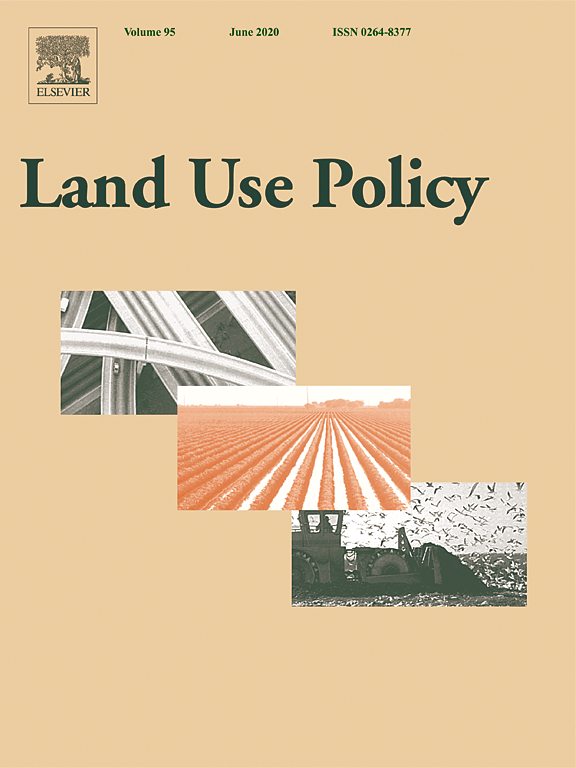Location
Land Use Policy is an international and interdisciplinary journal concerned with the social, economic, political, legal, physical and planning aspects of urban and rural land use. It provides a forum for the exchange of ideas and information from the diverse range of disciplines and interest groups which must be combined to formulate effective land use policies. The journal examines issues in geography, agriculture, forestry, irrigation, environmental conservation, housing, urban development and transport in both developed and developing countries through major refereed articles and shorter viewpoint pieces.
Land Use Policy aims to provide policy guidance to governments and planners and it is also a valuable teaching resource.
ISSN: 0264-8377
Members:
Resources
Displaying 71 - 75 of 279Can technology help achieve sustainable intensification? Evidence from milk recording on Irish dairy farms
This article explores the potential of a farm technology to simultaneously improve farm efficiency and provide wider environmental and social benefits. Identifying these ‘win-win-win’ strategies and encouraging their widespread adoption is critical to achieve sustainable intensification. Using a nationally representative sample of 296 Irish dairy farms from 2015, propensity score matching is applied to measure the impact of milk recording on a broad set of farm sustainability indicators.
Assessing economic instruments to steer urban residential sprawl, using a hedonic pricing simulation modelling approach
Over the past centuries, cities have undergone major transformations that led to global urbanization. One of the phenomena emerging from urbanization is urban sprawl, defined as the uncontrolled spread of cities into undeveloped areas. The decrease in housing prices and commuting costs as well as the failure to internalize the real costs associated with natural land, led to households moving-out into the urban fringe – resulting in fragmented, low-density residential development patterns that has multiple negative impacts.
Stakeholder power relations in Land Value Capture: comparing public (China) and private (U.S.) dominant regimes
Understanding stakeholder power relations—such as between land sellers, land buyers, and local governments—is crucial to understanding Land Value Capture (LVC). While scholars have focused on stakeholder relationships through approaches such as stakeholder salience, stakeholder interaction, stakeholder value network, and stakeholder multiplicity, much research either places insufficient focus on power or only stresses partial attributes of power. As a result, the role of power relations among key stakeholders in LVC remains insufficiently explored.
Local biophysical effects of land use and land cover change: towards an assessment tool for policy makers
Land use and land cover change (LULCC) affects the climate through both biogeochemical (BGC) and biophysical (BPH) mechanisms. While BGC effects are assessed at global scale and are at the heart of climate treaties such as the Paris Agreement, BPH effects are totally absent despite their increasingly recognized impact, especially at local scale. This stems from the complexity in characterizing their climate impacts both at local and global scale, which makes it impractical to offer clear advices for the development of climate policies.
Solving Brazil's land use puzzle: Increasing production and slowing Amazon deforestation
Brazil has become an agricultural powerhouse, producing roughly 30 % of the world’s soy and 15 % of its beef by 2013 – yet historically much of that growth has come at the expense of its native ecosystems. Since 1985, pastures and croplands have replaced nearly 65 Mha of forests and savannas in the legal Amazon. A growing body of work suggests that this paradigm of horizontal expansion of agriculture over ecosystems is outdated and brings negative social and environmental outcomes.



